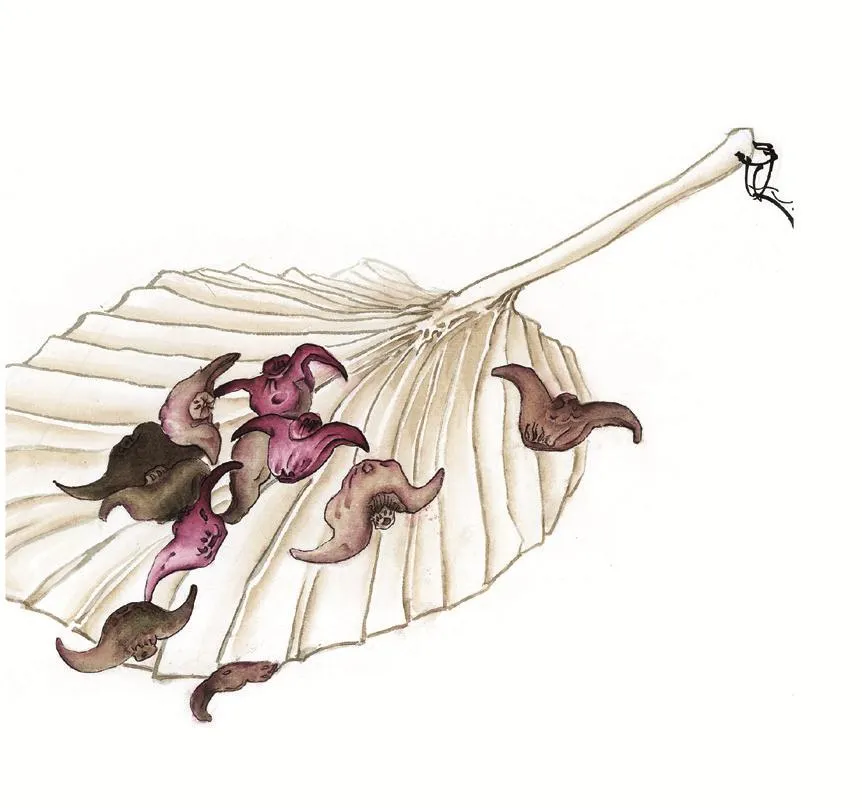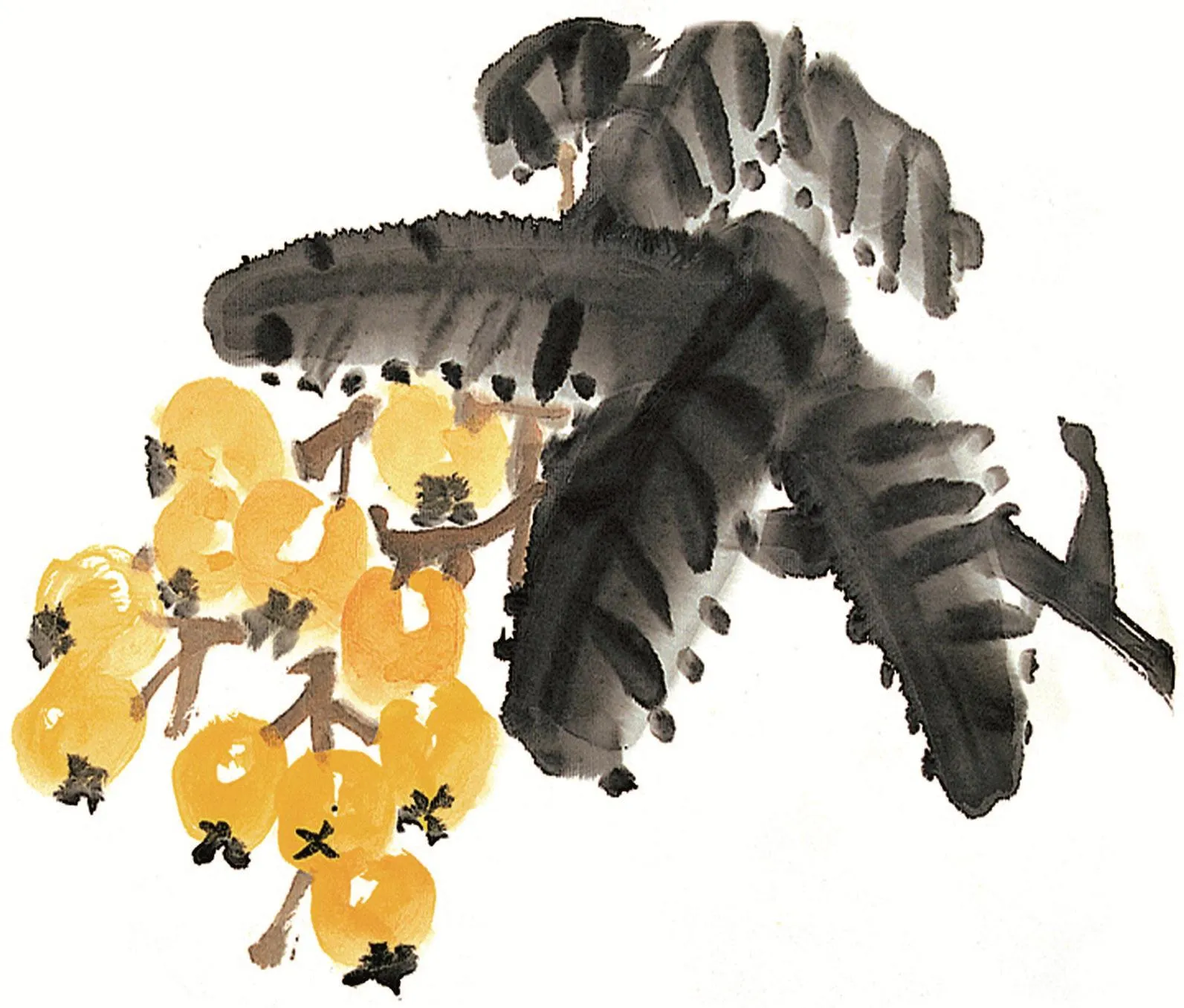花花草草下的人间况味
2017-09-25◇文|田东
◇ 文|田 东
花花草草下的人间况味
◇ 文|田 东

2014年4月,天津人民出版社出版了一套汪曾祺人间系列文集,包括《人间滋味》《人间草木》和《人间有戏》三本,到今年5月,这套书已经第6次印刷了。老爷子走了这么多年,每年还有不少出版社为他结集出书,“拦也拦不住”。我常在想,魅力到底在哪里?
读《人间滋味》,我们认识了一个吃货汪曾祺。今儿个,我想聊聊《人间草木》,从老爷子写“花花草草”的笔触间,找下答案吧。
In April 2014, Tianjin People’s Press published a collected works of Wang Zengqi, including Taste of the World, Plants in the World, and Operas in the World. Until May, this set of books has been reprinted for 5 times. Although Wang has died for several years, a lot of presses collect and publish his books every year. “Nothing can stop them.” I can’t help wondering what its charm is.
Reading Taste of the World, we have already known about Wang Zengqi,a foodie. Today, I’d like to talk about Plants in the World from which we might find out the answer.
长子爆料
Disclosures by Wang's Eldest Son
《人间草木》请了汪先生的长子汪朗先生作序,写了不少先生文字背后的故事,搁现在就叫“爆料”。
比如,如今被视作汪曾祺先生散文精品之一的《葡萄月令》,最初投稿时,被退过稿。当年写样板戏时,他动员剧团资料室买了一本清代状元吴其濬的《植物名实图考》,“这样的书,整个剧团恐怕不会有第二个人感兴趣,纯粹就是给他买的,简直是岂有此理。”有其父必有其子。文中,汪朗称父亲为“老头儿”,说“家中的老大也不是他”,说他有段时间被“挂”了起来,风趣幽默像极了汪曾祺。
谈到汪曾祺散文的特点,汪朗在序言中有这样两句。一说当年许多“反映‘右派’生涯的作品,都是又苦又悲又惨,现实生活也确实如此,但是老头却很少写这些内容,最多只是一笔带过,相反,对于生活中的美,哪怕只存在于犄角旮旯,他也要极力挖掘出来并着力表现,这是他作品的基调,是发自内心的诉说。”
还有一句在开头:“他的文章看着不闹腾,让人心里很清净,文字干净通透,不牙碜。”
读到这里,我大概明白为什么他的书会一出再出了。
Wang Lang, Wang Zengqi’s eldest son, has written the preface of Plants in the World and has written many stories behind his father’s words, which can be regarded as “tipoff”now.
For instance, Grape’s Growth in Lunar Months was sent back in its first submission to the presses. When writing about the model opera, he motivated the reference room of a troupe to buy An Illustrated Book on Plants which was written by Wu Qijun in Qing Dynasty. “This kind of book cannot attract a second person in the troupe. It was bought just for him. There is no such a rule.”Like father, like son. He is similarly humorous as his father.In the preface, Wang Lang called his father “old man” and said he is not the boss in the family, and that he was “hanged” for a period of time.
Talking about the features of Wang Zengqi’s prose, Wang Lang wrote in the preface that most works about “the Right” those days were as sad and bitter as the real life was sad and shocking. Wang Zengqi, however, rarely did so. On the contrary, he deeply dug out the subtle beauty of life, making it basic key of his works and narration of his heart.
Another sentence at the beginning of the preface is “his articles are not noisy but peace and quiet. His words are clean and penetrating.”
Here, I roughly understand why his books are reprinted on and on.
虫鸟之事
Things about Insects and Birds
汪曾祺被称为“中国最后的士大夫”,士大夫多少好“花鸟虫鱼”这口,这本书里更是少不了各种“虫事”“鸟事”。
老爷子把他逛公园观花看鸟,下放劳动时和树木花草打过的交道,还有儿时家乡的老树,访美时对异国花草的见闻等等,都倾注笔端。有的轻描淡写,寥寥数语,如“草木虫鱼鸟兽”篇里的《雁》《螃蟹》;有的浓墨重彩,引经据典,如《紫薇》《北京人的遛鸟》。鸟为什么要“遛”?什么叫压鸟?鸟食要准备些啥?架鸟又是怎么回事?外行人一读,立马能和行家对话而不露惧色。不过,书里打动我的,不是这些猎奇的内容,而是文字里饱含的通透感。
很多文章都写于30多年前,那是一个由物质的匮乏衬托出真诚的年代。那时,人们对美的歌颂大多集中在高大全的形象上,偶有用“一滴露珠反射太阳光辉”的方法去写点“小蜜蜂”的。要不然就是撕心裂肺的控诉,声泪俱下的悲情。
而可爱的汪老爷子“歌颂”的却是葡萄苹果,蝈蝈金鱼之类。现在看来,更显珍贵与真诚。老爷子不是说吗,“人不管走到哪一步,总得找点乐子,想一点办法,老是愁眉苦脸的,干吗呢!”
Wang Zengqi was called “the last scholar-bureaucratin China” who enjoy “flowers, birds, insects and fishes”more or less. Thus, this book contains all kinds of “insect things” and “bird things”.

In his essays, Wang Zengqi put down his experiences of watching flowers and birds in the parks, contacts with plants when working in the fields, the old trees in his childhood, and what he saw and heard when visiting America. Some are light sketches, such as Wild Goose and Crab in the series of“grass, trees, insects, fishes and birds”. Some, such as Ziwei and Walking Bird by Beijing People, are deliberately written by quoting from classics. Why birds need to be walked? What is “pressing the bird”? What should be prepared for the birds? What is “hanging the bird”? Nonprofessionals can communicate with the professional ones after reading this book. However, it is not the book and the novel content but the penetrating sense in the words that move me.
Many of his articles were written more than 30 years ago when the lack of materials set off sincerity, and people mainly praised the high and noble images and occasionally wrote about the “bees” “to show the brilliance of sun through a little dewdrop”. Or, they would write about grieved complaints and tearful pathos.
However, our lovely Wang Zengqi “praised” grapes and apples, crickets and fishes, which now seem more precious and sincere. Like he once said, “we have to find ways to enjoy ourselves and have fun no matter what we have been through. What is the point to wear a sad face forever!”
孰为草木
Who Are Plants
书名《人间草木》,顾名思义,谈论的是草木和人事。人们常说,“人非草木”。老爷子眼中倒也不竟然。
比如《熬鹰•逮獾子》这篇,讲的是早年间一帮子游手好闲的有钱人“熬鹰”——不让老鹰睡觉,用栓着细线的牛肉拉鹰肚子里的黄油,既熬掉鹰的野性,又让鹰很烦躁,好去捉兔子。有时,他们用棍子擀碎肥狗的尾巴,就为了让狗在草丛中捉獾子的时候尾巴不动,不惊动獾子。老爷子忍不住说:“你说人有多坏,怎么就想出了这些个整治动物的法子!”
有时,他又告诉我们,“人生一世,草木一春”,从某种角度来说,人这一辈子,和草木也差不多。芸芸众生,也不过是世间的一棵草,一棵树罢了。
一通读下来,唯有一丝不解,书中具体谈草木的文章至多一半强,另一半,先是带着你在祖国的大好河山到处跑,去了泰山上天山,逛了北京游四川,还在北温泉的数帆楼住了十几天,“那时嘉陵江水还是碧绿的。”最后干脆跑出国门,到美国去了。然又开始回忆各路文人,沈从文先生,赵树理先生,闻一多、金岳霖等等,还有他魂牵梦萦的西南联大。
这还不算,在“冬天的树”组文中,除了第一篇写树木,后两篇写《标语》《公共汽车》,哪一点有草木的影子?编者的用意有些费解,冒昧提出来,请方家指正。
Plants in the World namely discusses plants and human affairs. Although the old saying goes "men are not plants", Wang Zengqi held a different view.
For instance, Exhaust Eagles•Catch the Badgers talks about that a group of rich people in the early years“exhausted the eagles” by keeping them awake and pulling out the beef in their stomachs to exhaust the wildness of the eagles and make them annoyed enough to catch rabbits. Sometimes, these men would use sticks to crush the tails of dogs so that the dogs would not alert the badgers when they catch the badgers in the bush. Wang Zengqi said, "How mean people are! How could they think up these ways?"

Sometimes, he told us that man lives only once as plants live only for spring. To some extent, man is similar to plants.
Still, I have a trace of confusion that half of the book at most are about plants, and the other half leads us to enjoy the beautiful places in China, such as Mount Taishan, Mount Tianshan, Beijing and Sichuan. “The Jialing River was pure and green at that time.” Some even talks about Wang’s life in America. Then, it brings back memories of scholars, such as Shen Congwen, Zhao Shuli, Wen Yiduo and Jin Yuelin. The Southwest Associated University that he missed very much is discussed, too.
In the serial articles of “Trees in Winter”, except for the first article that writes about trees, the other two, Slogans and Buses have little trace of grass and trees. It is hard to understand the intention of the editors. Well, just my personal opinions with no offense. If there is any misunderstanding, please correct me.
Life Taste of Flowers and Grasses
Article | Tian Dong
